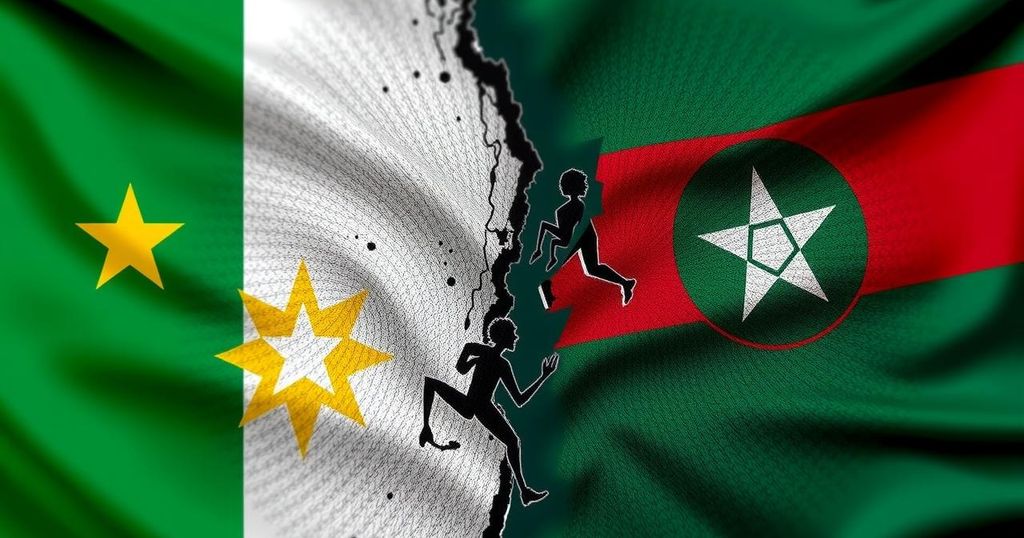Recent tensions between Somalia and Ethiopia have escalated following the expulsion of an Ethiopian diplomat by Somalia, citing interference in internal affairs. This move follows earlier expulsions and reflects deepening concerns over Ethiopian influence in Puntland and Somaliland. Somalia seeks to strengthen ties with regional allies, notably Egypt and Turkey, in its quest to assert sovereignty amidst ongoing diplomatic disputes.
The diplomatic relationship between Somalia and Ethiopia has once again soured, marked by Somalia’s recent expulsion of a prominent Ethiopian diplomat. The Ministry of Foreign Affairs of Somalia has issued an order for Ali Mohamed Adan, a counselor at the Ethiopian embassy in Mogadishu, to depart from the country within a span of 72 hours. This decision follows allegations that Adan engaged in activities that violated his diplomatic responsibilities, specifically interfering in Somalia’s internal matters. The Foreign Ministry emphasized that his actions breached the Vienna Convention on Diplomatic Relations, which stipulates that diplomats must respect the laws of the host country and refrain from meddling in its internal affairs. This incident is not isolated; it follows a similar expulsion earlier this year when Somalia removed Ethiopia’s ambassador and closed Ethiopian consulates in the regions of Somaliland and Puntland, citing Ethiopia’s governmental interference in Somali sovereignty. The backdrop to these tensions involves Ethiopia’s recent agreements with Puntland and Somaliland, regions within Somalia. The arrangement with Puntland, announced just days before the latest diplomatic spat, was designed to enhance bilateral ties amidst Puntland’s claim of independence from the Somali federal authority. Somaliland’s alliance with Ethiopia grants it military and commercial access to a section of coastline in exchange for Ethiopia’s acknowledgment of its independence, conditions that have yet to be fulfilled. In response to Ethiopia’s growing influence through these agreements, Somalia has sought to strengthen its security partnerships with neighboring countries and other external powers. Notably, Egypt has intensified its military cooperation with Somalia, supplying equipment and signing a defense pact, potentially to counter Ethiopia amid the protracted dispute regarding the Grand Ethiopian Renaissance Dam (GERD). Turkey has also increased its military footprint in Somalia, enhancing its support in light of recent developments, while also attempting to mediate the ongoing tensions between Somalia and Ethiopia through indirect talks held in Ankara, which have since stalled.
The tensions between Somalia and Ethiopia stem from a complex historical context that involves regional politics, territorial disputes, and issues of sovereignty. Ethiopia has been engaged in strategic alliances with regions in Somalia, notably Puntland and Somaliland, which are asserting their autonomy from the Somali federal government. This dynamic is particularly contentious given Somalia’s struggle to maintain national unity and sovereignty amid external influences. The frequent diplomatic expulsions highlight deep-seated fears in Somalia regarding Ethiopian interference in its domestic affairs. Moreover, the geopolitical landscape is further complicated by Egypt’s interests in countering Ethiopia’s regional ambitions, especially concerning water resource management linked to the Nile River.
In summary, the escalating tensions between Somalia and Ethiopia illustrate the fragile nature of their diplomatic relationship, characterized by mutual accusations of interference and competing regional ambitions. Somalia’s recent actions reflect a broader strategy to assert its sovereignty and counter external influences from Ethiopia and its alliances with autonomous regions. As these dynamics unfold, the involvement of external powers such as Egypt and Turkey continues to shape the geopolitical landscape in the Horn of Africa, with potential implications for regional stability.
Original Source: www.al-monitor.com






